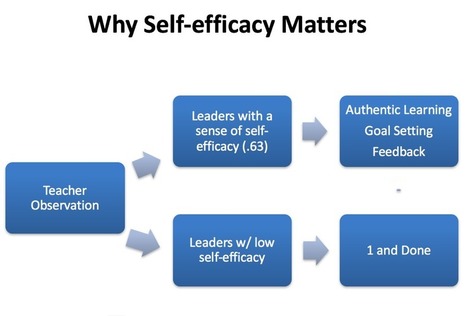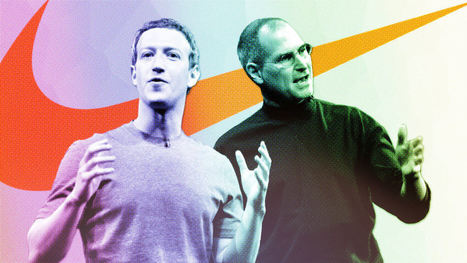 Your new post is loading...
 Your new post is loading...
What puts leaders at risk of failure is that too many of them believe they have to be experts at every single one of those responsibilities. After all, they were hired to lead? This is where we need to foster a change in mindset, because no one can meet all of the demands of leadership by themselves. And no one, needs to be an expert at everything. What leaders need is the belief that they can meet those demands by working collaboratively with their staff and school community.
Via Dennis Swender, june holley
Any conversation at work where you are asking someone for something is a form of negotiation. Effective managers and leaders use the principles of positive persuasion to get what they need and strengthen relationships in the process.
Via donhornsby
Steve Jobs famously said that creativity is just connecting things. But anyone facing a creative block knows it’s a lot harder than grabbing ideas out of thin air. Creativity is a complex process. There’s no “creativity gene” or section of your brain responsible for creative thought. We can’t choose to turn creativity on or off. As the Atlantic reports, many studies have found that creativity happens unconsciously and beyond our control. Yet despite its elusive nature, creative thought has become an increasingly important part of our lives. Basic tasks are being automated. Competition is getting more fierce. And your ability to come up with novel ideas is now one of your greatest skills. So whether you’re feeling distracted, out of ideas, or are coming up against a creative wall, here are some creativity exercises to help get the juices flowing.
Via The Learning Factor
It's been largely assumed that to run a successful business today, good leadership is required. But it's not the end of the world for leaders who worry that they're low on charisma or can't stir employees' hearts and minds. Maybe they don't particularly want to, and that's OK too. Sometimes, it's more effective for employees to be more loyal to the work instead of being more loyal to the leader. After all, the end goal should be to keep employees engaged and productive by charging them to solve compelling problems. First, it's important to understand the difference between an appealing boss and challenging work. A recent Harvard Business Review article found that employees at Facebook were more likely to quit because of their work--and not because of a "horrible" boss. The authors--three HR executives and Wharton professor Adam Grant--had spent years studying Facebook. When the social media giant started tracking employee exits, "all bets were on managers," the authors wrote. Turns out, employees left "when their job wasn't enjoyable, their strengths weren't being used, and they weren't growing in their careers."
Via The Learning Factor
Negotiation is a scary thing. Whether you’re a college grad advocating for a salary bump for the first time, or a seasoned employee who needs to convince their bosses to allocate a bigger budget for training and development–it’s a situation filled with nerves, personality clashes, egos, and uncertainties. Yet it’s something that all of us have to do, and the only way to do it successfully is if we know how we can leverage our strengths as best as we can in the situation that we’re in. Fast Company reached out to negotiation experts to learn how our personality traits can affect our negotiation styles, and why a collaborative “win-win” approach isn’t always the most effective.
Via The Learning Factor
Forget slogans and posters. Forget mission statements. Forget culture decks. A survey of over 400,000 people across the U.S. found that when employees believe promotions are managed effectively, they are more than two times as likely to give extra effort at work -- and to plan for having a long-term future with their company. But wait, there's more: When employees believe promotions are managed effectively, they are more than five times as likely to believe their leaders act with integrity. The result? At those companies, employee turnover rates are half that of other companies in the same industry. Productivity, innovation, and growth metrics outperform the competition. For public companies, stock returns are almost three times the market average.
Via The Learning Factor
Whenever any new technology emerges that challenges the way people and businesses have been doing things for years or even decades, the initial excitement is often overshadowed by uncertainty and reluctance to try something new. In the early days of the cloud, it was almost inconceivable to think that it would lead to such a profound shift in how businesses operate. More recently, the drive toward digital transformation has caused even greater anxiety in some organizations. In this age of digital transformation, all industries -- from manufacturing and banking to hospitality and retail -- are evolving. This means that decision makers must identify key business issues, not technology issues, that digital transformation can tackle. Companies need to not only harness the power of the latest digital technologies and platforms to stay relevant and competitive but also course-correct their business models based on evolving customer demands. This type of transformation should be seen as a journey, not a destination. It is a cycle of change and progress, both from a technological and organizational standpoint. It’s about constantly reassessing opportunities to do things better, faster and with greater scale in the evolving environment in which one’s business operates.
Via The Learning Factor
According to an Oxford University analysis, close to half of all jobs will be taken over by robots in the next 25 years. No wonder the press is full of handwringing about how workers will adjust and the best way to prepare the next generation for this A.I.-filled future. But not everyone is alarmed about the prospect of radical change in the labor market. After all, this has happened before (for instance, when mechanization replaced the vast majority of farmers) and it turned out OK. Plus, a lot of today's jobs are soul-crushingly boring and repetitive. Losing them just might be a blessing. Among these optimists are IT service company Cognizant. In a recent report (hat tip to Business Insider for the pointer), the consultancy notes that while creative destruction has always been with us, so has reinvention. Sure, robots will take jobs away, but they'll also create new ones. What will these new gigs look like exactly? The report imagines detailed job ads for 21 future careers that Cognizant thinks may emerge in the next 10 years.
Via The Learning Factor
What do people want out of work? More than money, more than benefits, much more than job security, a recent survey says, they want to be treated with respect. If that sounds like you, how can you increase the respect you get each day at work? It turns out that there are specific habits you can cultivate that allow you to train the people you work with to treat you respectfully each day. Here are 33 of these proven habits that can help, if you're willing to stick with them. Implement a few, take inspiration from the others, and you'll likely see dividends quickly.
Via The Learning Factor
You’re sitting there at your desk with a pit in your stomach. You know you really blew it–and your boss does, too. Maybe you forgot to follow up with an important client and they chose someone else’s proposal. Maybe you didn’t prepare the right documents in time for a super-important meeting. Or a careless typo you made on a spreadsheet or purchase order led to an expensive mistake. Whatever it is, your boss isn’t happy. That’s the bad news. The good news is that you don’t need to start job-searching. In fact, there are a few simple steps you can take right away to rebuild the trust you’ve lost–as quickly as humanly possible. Here’s what to do and when to do it.
Via The Learning Factor
Tis the season for stress. The holidays are crazy enough, but add in year-end deadlines and sales goals, performance reviews, and the news of yet another raise not given, and you can already feel your blood pressure rise. But there’s good news: You can still stay healthy, even when work is insane. It’ll just take a little extra effort. “When stress takes over, often the first things to go are the ones we need the most–sleep, water, exercise, whole nutritious foods,” laments nutritionist Brigitte Zeitlin. “And that can actually compound the issue, leaving you less equipped to handle the stress well.” Here’s exactly what you can do to keep that from happening before work gets really crazy.
Via The Learning Factor
Let’s not waste any time. The simple solution that we’re all looking for: It doesn’t exist. Want your business to thrive like Amazon’s? Want to emulate Steve Jobs or Mark Zuckerberg? Follow the road map of Nike or Warby Parker to build the next brand that matters? Sorry, it doesn’t work that way. What succeeded for them may not work for you. Too bad. Get over it. One-size-fits-all strategies just aren’t effective in today’s age of flux (and maybe they never were). That’s one of the insightful messages in senior writer Austin Carr’s feature The Future of Retail in the Age of Amazon. It’s become common practice to refer to billion-dollar startups as “unicorns,” but there is no more one-of-a-kind business than Amazon: hard-driving, customer-focused, yet broadly directed, from books and groceries to entertainment, consumer electronics, and web services. Carr explains that competing with Amazon today–trying to beat it at its own game–is largely a fool’s errand. Instead, what increasingly defines retail success, and points the way toward the businesses of tomorrow, is a bespoke model, one that is crafted to deliver on a focused need, proposition, or brand essence.
Via The Learning Factor
Many people spend their days sitting at their desks alone as it is–communicating through email, Slack, or text rather than in person, and leaving little opportunity to feel as though they’re pulling together as a group. Even in a busy environment like a bar, colleagues might not get to interact much amid the chaos of a full house. Taking time to give back through collaborative volunteer work breaks the normal cycle of work. It gives team members a chance to reestablish their connections with each other without having to achieve a particular goal in their own workplace. And it can reinforce collegial relationships even after everyone returns to work, because they’ve contributed to a goal that’s actually meaningful. That’s far better than just going to some strange corporate retreat where you solve a pointless but difficult problem and leave without making any lasting impact.
Via The Learning Factor
|
Traditional goal setting focuses on the beginning and the end—start strong and keep your eye on the prize. Unfortunately, that process doesn’t work for every kind of goal, says Scott Young, author of How to Change a Habit. “A lot has been taught around the classic self-help style of Zig Ziglar or Tony Robbins where you have a clear goal, you visualize it, write it down, and focus on the starting point,” says Young, cofounder of the career development course Top Performer. “Some goals, though, aren’t clearly sequential.” The middle can and should be your starting point when you’re setting a goal where you’re unclear of the level you can achieve within a particular timeframe. This is especially the case with daunting, unfamiliar goals where you don’t yet have a strong sense of the big picture.
Via The Learning Factor
Advice on how to improve one’s self is everywhere. It accounts for about 2.5% of all book sales in the United States. Add in speeches, training programs, TV programs, online-products, coaches, yoga, and the like, self-help is a $10 billion industry per year, and that’s just in the U.S. However, research shows that much of the advice extolled may be misleading or even wrong. Several myths about performance persist, despite research and practices that show they are half-truths at best. That might explain why the most likely purchasers of self-improvement books have bought another within the previous 18 months. The first myth-riddled book didn’t work, so they bought another, and maybe another soon after. A recent report in the Journal of Management noted that of nearly 25,000 academic articles on performance, only a fraction include what psychologists call within person variance, which describes ranges, such as that between individuals’ top, average and worst performances. Advice too often mistakenly assumes performance can be compared across people, using the same gauge. That’s absurd. Our observation of hundreds of performance seekers largely confirms the report and has led to delineating a series of myths that hold people back when trying to improve. These assertions are based on a diverse set of fields, including psychology, sports, arts, and leadership. We hope that by dispelling these myths, explaining the reality and offering some sound advice instead, we can help move people toward more effective personal development.
Via The Learning Factor
What are the defining attributes of great leaders? That's the age-old question thought leaders and scholars galore have been attempting to answer in mountains of books and literature. While great leadership, to an extent, can be personal and subjective to the follower, there are universal principles you can't argue with (but you can try). Speaking of those thought leaders and scholars, here are six traits that keep surfacing over and over again in the leadership literature and best-sellers. 1. They challenge their own assumptions. Great leaders may be smart and know a lot, but they are humble enough to recognize there are smarter people in the room that they can learn from. They don't restrict themselves from opinions and input outside of their own. They surround themselves with diverse perspectives to help them answer questions like, "How do I know my decision is the right one?" or "Is there a better course of action here?"
Via The Learning Factor
To make a good decision, you need to have a sense of two things: how different choices change the likelihood of different outcomes and how desirable each of those outcomes is. In other words, as Ajay Agrawal, Joshua Gans, and Avi Goldfarb have written, decision making requires both prediction and judgment. But how do you get better at either? We’ve published volumes on this subject —here are a few of my favorites — but there are three rules that stand out. Following them will improve your ability to predict the effects of your choices and assess their desirability. Rule #1: Be less certain. Nobel-prize-winning psychologist Daniel Kahneman has said that overconfidence is the bias he’d eliminate first if he had a magic wand. It’s ubiquitous, particularly among men, the wealthy, and even experts. Overconfidence is not a universal phenomenon — it depends on factors including culture and personality — but the chances are good that you’re more confident about each step of the decision-making process than you ought to be. So, the first rule of decision making is to just be less certain — about everything. Think choice A will lead to outcome B? It’s probably a bit less likely than you believe. Think outcome B is preferable to outcome C? You’re probably too confident about that as well. Once you accept that you’re overconfident, you can revisit the logic of your decision. What else would you think about if you were less sure that A would cause B, or that B is preferable to C? Have you prepared for a dramatically different outcome than your expected one? You can also practice aligning your level of your confidence to the chance that you’re correct. Try out quizzes like this one or this one. You’ll realize that while it’s not possible to always be right, it’s totally possible to become less overconfident.
Via The Learning Factor
Every year for the past ten years, Glassdoor announces the top places to work all across North America and parts of Europe. The most unique part of this award? You can only win the award if your employees say so. Glassdoor's methodology for the award includes a collection of anonymous company reviews where employees share their honest opinion on pros and cons of working for the company, overall satisfaction, the CEO, and workplace attributes. They're also asked if they would recommend their employer to a friend. It's a juicy turn of the tables. Within the top 100 best places to work for, the industries that came out on top were tech, retail, healthcare, consulting, finance, and travel and tourism. The top cities included the Bay Area, Boston, and Los Angeles (just to name a few). So, what does it take to be the top of the top?
Via The Learning Factor
Of all the things you learned in school, chances are the right way to learn wasn’t one of them. To make it through academic life, most of us opt for what psychologists call “massed practice,” better known as cramming: It’s Monday and your test is Friday, so you save studying for the night before. One four-hour session can nab you a passing grade, so why not? Well, because that’s not how your brain likes to absorb information. You might remember enough to pass your exam the next day, but just a week or two later and the details will already be fuzzy, if not gone completely. Here’s how to do better.
Via The Learning Factor
Behind every great athlete there is an even greater coach. There isn't a top athlete--from Muhammad Ali to Tiger Woods to Serena Williams--who did not need a mentor to help them reach the top of their profession. If you think about it, your business is similar to that of an elite athlete. You may have the drive, the skills, and the vision, but there are times when you need professional guidance to ensure you stay on the right path, and how to best utilize your talents and work on your shortcomings in order to reach your goals. An executive coach can be that person. No matter where you are on your career path--from eager up-and-coming manager to a seasoned senior executive to an entrepreneur--there will be times when you can benefit from some professional coaching.
Via The Learning Factor
If you’re constantly frazzled on the job, logging super-long hours with little to show for it at the end of the day, chances are good that you’re mismanaging your time. But the good news is it’s easy (enough) to reorganize your schedule and get back on a successful track, stat! “There’s a lot coming at us: mail–and [all kinds of] paper in general–emails, texts, phone calls, bosses calling for help, deadlines, projects–it doesn’t stop,” points out Felice Cohen, organizer and author of 90 Lessons for Living Large in 90 Square Feet (or More). No wonder so many of us get so behind and feel so exasperated. But it doesn’t have to stay that way. The answer isn’t to do more. “Not everyone can multitask, and most of us who do probably shouldn’t,” says Cohen. Rather, the answer is to do what you do smarter. And here’s how.
Via The Learning Factor
Though your coworkers and manager might not understand tiny shifts in your behavior instantly, you’re giving away many invites into your psyche, simply via your body language. According to professional corporate trainer, business consultant, and entrepreneur Denise M. Dudley, PhD, all people communicate using seven channels: facial expressions, eye contact, posture, hand gestures, voice tone, voice loudness, and verbal content. While she explains that many professionals are picky with their word choices, very few practice or give a second thought to the other six venues. This is a big loss, considering many studies indicate difficulty pairing sentences with sentiments. “Our bodies are actually revealing more about our messages than our voices ever do,” Dudley told Ladders. “When we’re delivering a message–any message, good or bad, large or small, how we look as we’re delivering the message is . . . probably more important than our words, if we intend to be understood.”
Via The Learning Factor
If you’re interested in behavioral economics, then you probably heard that Richard Thaler, one of the discipline’s founding fathers, was recently awarded the Nobel prize in economics. You might also be sold on how insights from behavioral science can make a big impact in your organization. You may even have piloted a couple of nudge-based interventions in your organization and are now asking yourself, “What’s next?” You aren’t alone. Increasing numbers of companies are looking to build a behavioral science team — one that is located at the very center of their business and that the whole organization can benefit from. This makes sense, because the alternative is for behavioral insights to be tried out by individuals or specific departments, and their knowledge and skill are likely to vary: Someone in marketing might use their behavioral knowledge to develop more-effective campaigns, while at the same time someone in HR uses theirs to focus on employee engagement. Sales could be developing a behaviorally informed strategy, while operations looks for ways to cut costs.
Via The Learning Factor
If you’re always working for the weekend, you’re not alone. Just one-third of employees are actively engaged at work, leaving the majority of us unhappy on the job, according to the most recent State of the American Workplace Gallup poll. Instead of keeping an eye on the clock and the calendar, take the reins by creating a career that you love, experts suggest. “People often find themselves on a lifelong career journey without a destination in mind, only to look back at some point and realize they are not where they expected or wanted to be professionally,” says Tom Kemp, MBA executive-in-residence at the University of Richmond’s Robins School of Business. “Often this reflection happens when they either find themselves confronted with a job loss or they simply become so disenfranchised that they quit with little idea or thought about what they want to do next.”
Via The Learning Factor
Successful entrepreneurs have a lot of things in common; one is knowing how to make the best use of their time. When the clock is ticking and they are under pressure to deliver, many have a favourite productivity hack to ensure things get done on time. Here, seven entrepreneurs share their tried and tested ways of being more productive. Create artificial deadlines Business expert and author of The Startup Coach Carl Reader uses a clever technique of creating artificial deadlines to guarantee a productive finish. “One of my favourite tricks is the ‘train journey to nowhere,” he said. “I book a return train ticket, don't take my mobile phone, and set a completion target for the journey. With a clear deadline and no distractions, I find that I often produce more than I would in the office in a whole day. It's great if you can tie this around meetings that you need to travel to, but if not, the productivity boost is well worth the cost of a train ticket.”
Via The Learning Factor
|



 Your new post is loading...
Your new post is loading...



















































Anyone that has just been appointed a manager or on the path of management will be scrambling around like crazy trying to learn what it takes to be an effective manager. You'll enjoy this article - collaboration is one of my own personal favorites and I believe it unites teams, gives them a common purpose and allows employees to be heard and trusted. Go On Collaborate Today for better results...